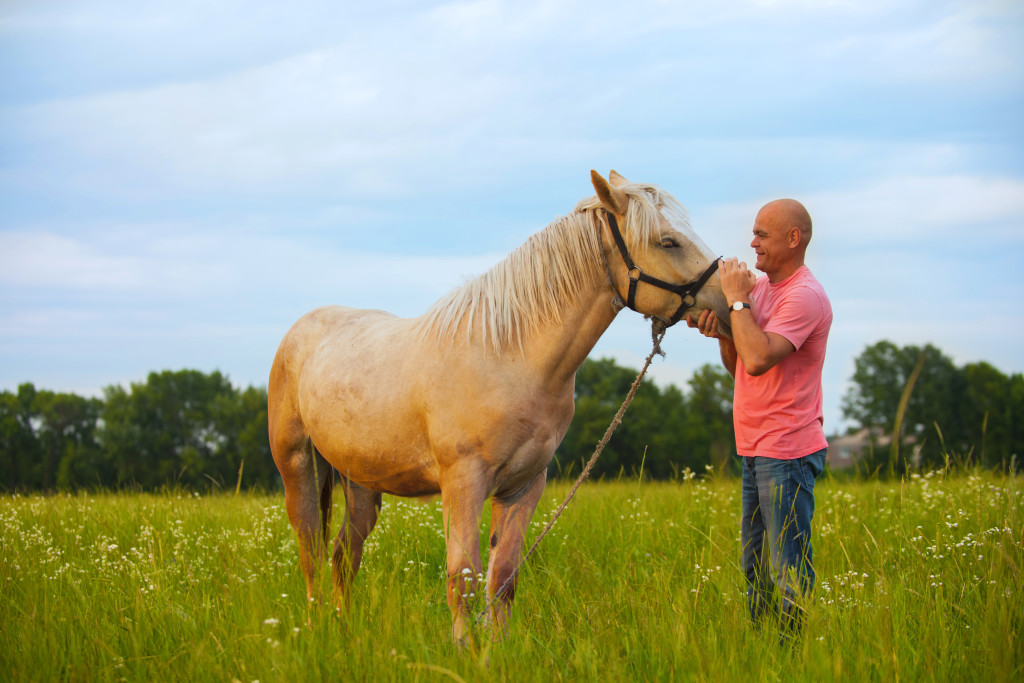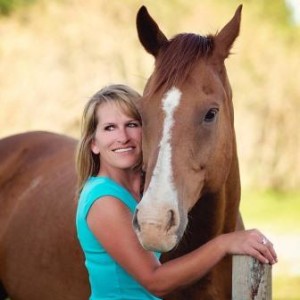- Calls to this hotline are currently being directed to Within Health, Fay or Eating Disorder Solutions
- Representatives are standing by 24/7 to help answer your questions
- All calls are confidential and HIPAA compliant
- There is no obligation or cost to call
- Eating Disorder Hope does not receive any commissions or fees dependent upon which provider you select
- Additional treatment providers are located on our directory or samhsa.gov
Why Equine-Assisted Therapy in Eating Disorder Treatment is So Helpful

Contributed by Canopy Cove
There are few individuals in the world that haven’t experienced the emotional benefit that comes from animals. Using this relationship to benefit mental health treatment is a relatively new concept but Equine-Assisted Therapy is making strides.
An article discussing the benefit of animal-assisted therapy in Counseling Today explains perfectly that “well-trained therapy animals can help counselors establish therapeutic bonds with their clients more quickly and can also alert counselors to emotions that clients may not have expressed yet verbally [1].”
In relation to eating disorder treatment, equine, horse-assisted, therapy has become popular and proven to be beneficial in many ways.
Animal Instincts in Equine-Assisted Therapy
Animals are incredibly intuitive, especially horses. One therapist in the article mentioned above, Hallie Sheade, specializes in equine-assisted therapy and describes that horses pick up quickly on emotional energy and, in doing so, provide insight to the therapist about what the individual is going through that they may not have said.
For example, Sheade explored how she used equine therapy with veterans and said that, often, when the veteran begins sharing their trauma, the horse will signal the herd to leave due to sensing the individual’s anxious energy building [1].
Sheade also shared that, in sessions with children, “if a child is playing alone in the sandbox because he or she is tired or upset, one or more of the horses tend to gravitate toward the child to give them comfort [1].” This animal intuition allows the individual to be comforted and the therapist to learn without anything being said.
Human Perception of Equine-Assisted Therapy
A therapist also learns a lot about the client during equine-assisted therapy. If the animal behaves a certain way, an individual’s interpretation of these behaviors is very telling.
Does the individual assume it is because the animal didn’t like them or that they would rather be around another client? How the individual interprets the horses’ behavior in relation to themselves says a lot about their own feelings of self-worth.
Social Learning
It does not seem to initially make sense that a human could learn a lot about social interaction from a horse. This learning often occurs because “the human wants the horse to be around them [1].”
If an individual finds that the horse doesn’t want to interact with them, a conversation opens about their own approach and behaviors and how that impacts the horse. This lesson can then be transferred to social interactions with others; how do your behaviors impact those around you and vice-versa?
Distractions
 As mentioned above, horses are highly perceptive and often don’t want to be around individuals whose emotional energy are not congruent with their own [2].
As mentioned above, horses are highly perceptive and often don’t want to be around individuals whose emotional energy are not congruent with their own [2].
In addition to focusing on approaching calmly, horses weigh approximately 1,000 pounds, and there is a lot that goes into interacting with them properly and safely.
With all of this to focus on, “patients have reported not thinking at all about their usual preoccupations (food, weight, appearance) while interacting in the equine session [2].”
A Safe Space
Perhaps the most obvious of reasons why equine-therapy is effect involves the simple fact – horses, like all other animals, don’t judge us.
When an individual is surrounded by diet culture messages and is continually berating themselves, the comfort of receiving unconditional love with no questions asked can be enough to inspire self-love and healing.
References:
[1] Meyers, L. (2018). The people whisperers. Counseling Today, 60:7, 24-29.[2] DeZutti, J. E. (2013). Eating disorders and equine therapy: a nurse’s perspective on connecting through the recovery process. Journal of Psychosocial Nursing and Mental Health Services, 51:9, 24-31.
About Our Sponsor:
Canopy Cove Eating Disorder Treatment Center is a leading residential Eating Disorder Treatment Center with 25 years’ experience treating adults and teens who are seeking lasting recovery from Anorexia, Bulimia, Binge Eating Disorder and other related eating disorders.
We are a licensed rehabilitative provider accredited by the Commission on Accreditation of Rehabilitation Facilities. Trusted and recommended by doctors and therapists throughout the country, our program provides clients with clinical excellence and compassionate care.
As one of the most experienced Eating Disorder Centers in the nation, we’ve developed a highly effective program that incorporates solid evidence-based therapies which have been shown to increase recovery rates.
- Each person we treat receives a customized treatment plan tailored to their specific needs.
- We increase recovery rates by simultaneously treating co-existing conditions such as anxiety, depression. (We also accept clients with an Eating Disorder and co-existing Diabetes).
- We provide family education and family therapy throughout the recovery process. (Offered by phone for out of town families).
Our Christian-based eating disorder treatment program warmly accepts all clients from various belief systems.
Get help now. Call 855-338-8620.
www.canopycove.com
info@CanopyCove.com
 About the Author:
About the Author:
Margot Rittenhouse, MS, PLPC, NCC is a therapist who is passionate about providing mental health support to all in need and has worked with clients with substance abuse issues, eating disorders, domestic violence victims, and offenders, and severely mentally ill youth.
As a freelance writer for Eating Disorder Hope and Addiction Hope and a mentor with MentorConnect, Margot is a passionate eating disorder advocate, committed to de-stigmatizing these illnesses while showing support for those struggling through mentoring, writing, and volunteering. Margot has a Master’s of Science in Clinical Mental Health Counseling from Johns Hopkins University.
The opinions and views of our guest contributors are shared to provide a broad perspective of eating disorders. These are not necessarily the views of Eating Disorder Hope, but an effort to offer a discussion of various issues by different concerned individuals.
We at Eating Disorder Hope understand that eating disorders result from a combination of environmental and genetic factors. If you or a loved one are suffering from an eating disorder, please know that there is hope for you, and seek immediate professional help.
Published on November 28, 2018.
Reviewed & Approved on November 28, 2018, by Jacquelyn Ekern MS, LPC
Published on EatingDisorderHope.com

The EatingDisorderHope.com editorial team comprises experienced writers, editors, and medical reviewers specializing in eating disorders, treatment, and mental and behavioral health.

